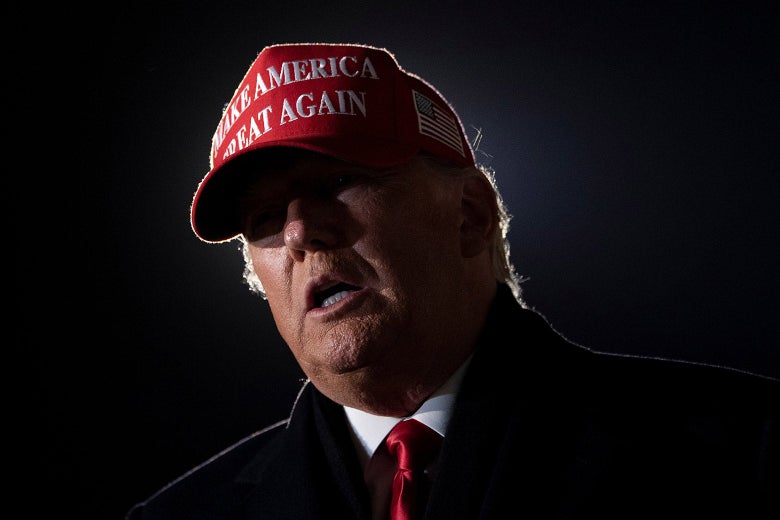
As of Wednesday morning, it is possible, even likely, that Joe Biden will win this race after all the ballots are counted. But the outlines of his victory—and the profile of the country he’ll try to govern—are very different from what the polls and pols assumed before the votes were cast.
Many commentators had predicted—and the numbers seemed to support them—that Trump would not only lose but get crushed. In 2016, they allowed, many voters gave this flamboyant outsider a chance. But in 2020, after four years of seeing him in action, buyer’s regret would set in; turnout would skyrocket, especially among women and young people. All this meant Biden and other Democrats would win big.
The logic seemed clear. The economy is in a deep slump—and Trump refuses to negotiate a stimulus package with the Democratic-controlled House. The pandemic has killed more than a quarter million Americans, with another 1,000-plus dying each day—and Trump says the death toll is a hoax contrived by greedy doctors. He violates every norm in the civics books, pressures his attorney general to prosecute Biden and Hillary Clinton, dismisses intelligence reports that contradict his own prejudices, is denounced as unfit for the White House by dozens of former officials and retired officers, many of them highly esteemed.
Yet this seems to have mattered much less than expected. Turnout did skyrocket but not entirely to Biden’s advantage. Whoever winds up winning, it will be a squeaker not a blowout.
This raises a much broader, more disturbing question. During the campaign, Biden and many of his surrogates, including former President Barack Obama, one of the most popular men in public life, would recount a few of Trump’s inadequacies and say, “This isn’t who we are.” Well, maybe in fact, it is.
The conventional wisdom is that Hillary Clinton lost because she was unpopular and ran a bad campaign, because the Russians meddled with social media, and because FBI Director James Comey reopened the probe into her emails just days before the election. All of this is probably true. But we now also see a simpler reason: a lot of Americans really like Trump—and this remains true even in the absence of Hillary or (as far as we know) outside interference.
The fact is we are, perhaps more than any time since the late 1850s, a divided country—divided not only by ideology and policy preferences (that’s normal; it’s what elections are supposed to decide) but also by the way we see the world. The two sides seem to occupy different universes. One universe observes facts, respects science, and values at least the goals of democracy and civility; the other universe does not. And the two view each other with seething contempt. Trump may wind up defeated, but Trumpism very much endures.
In the current issue of the New York Review of Books, the playwright and essayist Wallace Shawn recalled that, when he was growing up, in the 20 years after World War II (the same time Joe Biden came of age), American politicians won votes by promising to help people in need. “Americans seemed addicted to the feeling that their country represented goodness, decency, and kindness in a world where evil had almost prevailed,” Shawn wrote. As he learned later, from books, travels, and talking with people, America had also long perpetrated “unspeakable massacres” from the country’s very beginnings. But still, the legacy of our values restrained us from lurching deep into the dark side and even prodded us into doing many genuinely good things. What’s new about Trump is that he has discarded the entire myth, and, Shawn writes, many Americans “seem to feel a great sense of relief.” He goes on:
The fact that the leader of one of our two parties … was not ashamed to reveal his own selfishness, was not ashamed to reveal his own indifference to the suffering of others, was not even ashamed to reveal his own cheerful enjoyment of cruelty … all of this helped people to feel that they no longer needed to be ashamed of those qualities in themselves either. They didn’t need to feel bad because they didn’t care about other people. … In a world in which the rich want permission to take as much as they can get without feeling any shame, and many of the not-rich are so worried about their own sinking fortunes that they find it hard to worry about the misery of anyone else, Trump is the priest who grants absolution. In a way, he seems to be telling his followers that perhaps compassion is just one more value of the elite culture that he and they hate, like speaking in long sentences and listening to classical music.
A half century ago, some academic leftists, especially in Britain, coined the term “actually existing socialism” to describe the countries of the Soviet empire, especially East Germany. The idea was to distinguish these sclerotic, oppressive regimes, which they saw as distortions of socialism, from the ideology’s original ideals. In much the same way, it may now be useful to refer to our current politics as “actually existing America.”
It is who we are; it’s just not who many of us feel we’re supposed to be.
"lose" - Google News
November 04, 2020 at 10:40PM
https://ift.tt/2GsEdAp
Maybe This Is Who We Are - Slate
"lose" - Google News
https://ift.tt/3fa3ADu https://ift.tt/2VWImBB
Bagikan Berita Ini














0 Response to "Maybe This Is Who We Are - Slate"
Post a Comment